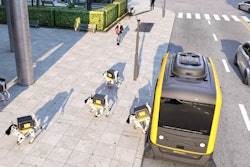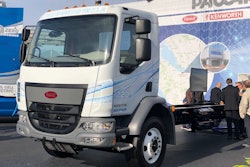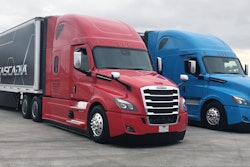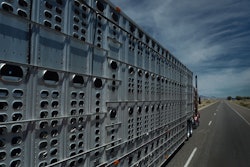I’m a sucker for today’s consumer technology. Being able to yell at a puck-sized device from across the room to play a specific song, turn on or off lights or lock the front door are conveniences I didn’t even know I needed just a few years ago when home assistants were first introduced.
So when I get the opportunity to attend the Consumer Technology Association’s annual Consumer Electronics Show in Las Vegas, naturally I’m all in. Getting to wander the exhibit halls every year to gawk at 8K TV displays, smart kitchens and virtual reality systems is a pretty big job perk.
But CES isn’t just a show for consumers anymore. Transformative technology in the automotive industry has emerged on the show floor in recent years. The automotive pavilion has grown in relevance to the point that it has forced the Detroit Auto Show from January to June just to stay away from the CES news cycle.
Players in the trucking and transportation space also have found a home at CES, a point I tend to hammer home as justification for heading back out there in 2020. Paccar was the predominant truck OEM at this year’s event, showcasing the Peterbilt Model 220EV electric medium-duty truck and announcing a partnership between Kenworth and Toyota to develop a fuel-cell electric version of the T680 tractor.
TuSimple, a global automated drive systems company, displayed its SAE Level 4 autonomous technology on an Inter- national LT tractor. The company, already running routes with customers in Arizona, announced it will increase its fleet of 11 trucks to 40 and expand its coverage to Texas later this year.
And although it was not directly affiliated with CES, Daimler Trucks North America also held an event in conjunction with the show to unveil its new Level 2 (partially automated) Freightliner Cascadia.
Other industry players demonstrated future visions for driverless urban transportation and robotic package delivery systems, but perhaps the most relevant technologies on display were the myriad of cameras and sensors scattered around the exhibit halls.
Paccar showcased fuel-cell and electric concept vehicles at the 2019 Consumer Electronics Show in Las Vegas.
These systems represent the underpinnings of future technology that will help autonomous trucks see farther down the road and make better, quicker decisions.
Baidu, a Chinese artificial intelligence giant, outlined its roadmap for Apollo Enterprise, an open-source platform for autonomous transportation development that includes geo-fenced highway autonomous driving by the end of the year and fully autonomous driving on urban roads and highways by 2021. Last year, Wabco signed a strategic agreement with Baidu to create hub-to-hub SAE Level 4 autonomous control for commercial vehicles.
Mobileye and Valeo, a French technology firm and maker of LiDAR (Light Detection and Ranging) systems, signed an agreement to develop and promote a technology-neutral industrywide autonomous vehicle safety standard that will define “logically provable rules and defined processes” based on human concepts of safe driving.
These are just a few examples of how the transportation industry and technology firms are working to make a brighter, safer future for passenger cars and commercial vehicles a reality. As autonomous technologies for commercial vehicles continue to grow, so should trucking’s footprint on the CES exhibit floor.
In the meantime, I think I’ll go ahead and ask Alexa to schedule an out-of-office reminder for next year’s show.










